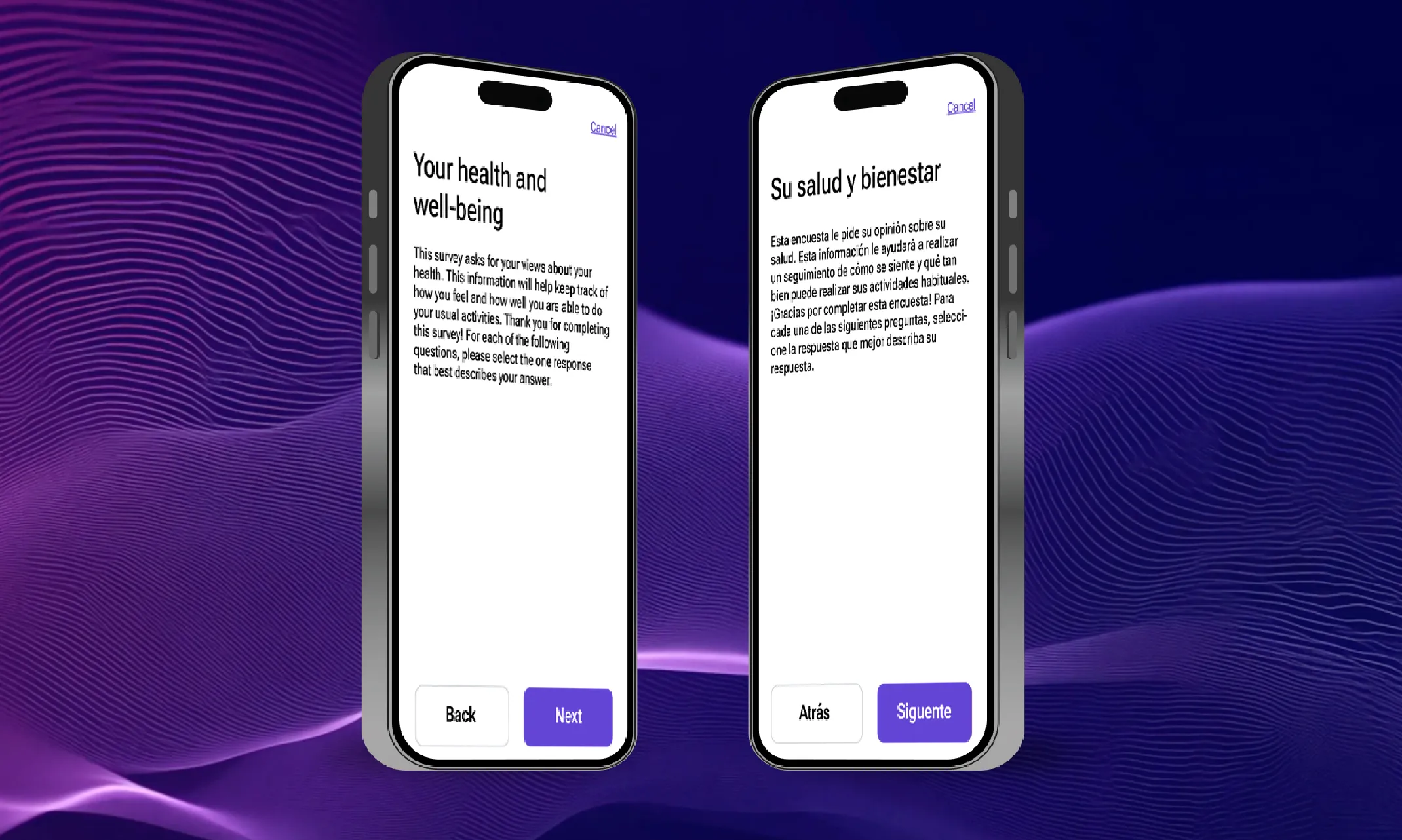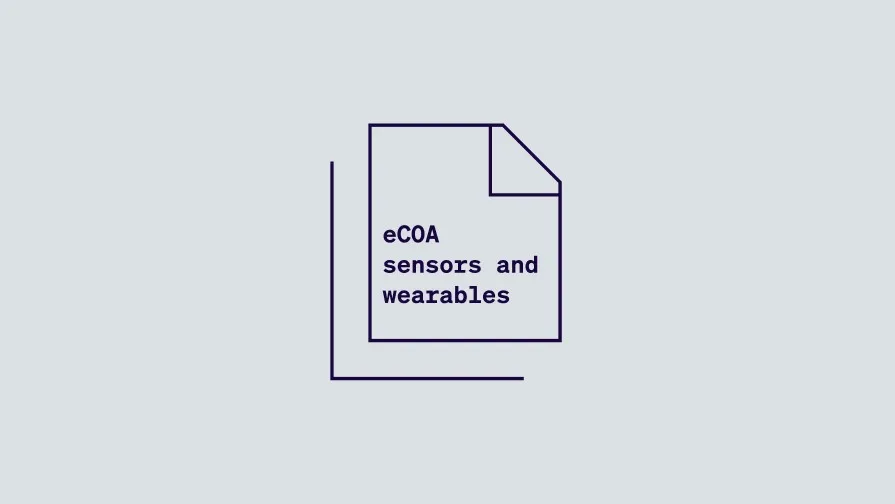eCOA+


How to successfully transition from paper COAs to eCOA
Electronic clinical outcome assessment (eCOA) systems have reshaped how patient-reported outcome measures are collected and managed in clinical trials. Clinical operations leaders are under more pressure than ever to ensure that the migration from legacy paper instruments to digital platforms not only improves trial efficiency but also preserves data integrity, supports regulatory acceptance, and enhances participant experience.
The transition from paper to electronic capture represents a paradigm shift toward more efficient, accessible, and reliable data collection. Done well, eCOA strengthens evidence generation while reducing burden for participants and sites alike. Done poorly, it risks measurement bias, loss of comparability, and regulatory challenges.
In this article, clinical operations leaders will find evidence-based best practices for migrating and implementing patient-reported measures as part of eCOA strategies. These recommendations are rooted in published industry guidance and emerging scientific consensus, and they reflect the evolving landscape of digital assessment technologies.


Common eCOA implementation pitfalls and how to avoid them
The global eCOA (electronic clinical outcome assessment) solutions market was valued at over two billion dollars in 2025, and is projected to expand rapidly over the coming decade, driven by increased clinical trial activity, digital transformation efforts, and the integration of mobile, cloud, and AI-enabled tools for outcome measurement.
This growth reflects not just broader industry digitization, but an evolving expectation: that outcome data should be accurate, audit-ready through validated systems and controlled operational processes, and capable of supporting decentralized workflows.As more sponsors and CROs incorporate eCOA into their trial strategies and regulators continue to emphasize electronic data integrity the stakes of successful implementation have never been higher.
Yet with greater adoption comes greater complexity: pitfalls around site burden, mid-study amendments, device logistics, and training gaps can undermine even the most advanced platforms if not thoughtfully addressed.
The good news? These common challenges can be anticipated and managed with practical, operationally aligned planning turning eCOA from a source of friction into a strategic advantage for trial success.


Eliminate clinical trial white space with the right AI strategy
It has become clear that our industry has reachedthe limits of human-only clinical development. As clinical trials have become increasingly complex, the endeavors that people alone can perform are no longer sufficient to generate the momentum needed to address the growing burden of human disease. This has led to longer drug development timelines and significant delays for patients. One large are of lost time is “white space,” definied simply as unproductive time caused by manual, sequential processes and fragmented data systems. Thankfully, a solution lies in agentic AI and its abilities to perform series of tasks.


From bottlenecks to breakthroughs: How AI is transforming translation timelines
According to ClinicalTrials.gov, there are 3,046 multi-country trials being conducted this year. While many trials remain localized within a single country, there has been a definitive movement towards conducting trials in multiple countries, especially for larger, later-stage trials. This is driven by the positives that multi-country trials offer, like faster patient recruitment, lower costs in some regions, and the need for diverse patient populations.. However, behind the scenes, a critical bottleneck has been slowing many trials down. This bottleneck is the translation process that’s required to make trials work across multiple languages, locales, and regulatory bodies/organizations.


Case Study: Medable, CRO, & pharma partner to accelerate clinical trial deployment at scale
A top-3 contract research organization (CRO) and a top-10 pharmaceutical company partnered with Medable to help accelerate the speed, scale, and standardization of their eCOA trials.
The two organizations had been hampered by lengthy configuration timelines, inconsistent designs across studies, and siloed processes between sponsors and their CRO partners.
By centralizing the sponsor’s preferred instruments and configurations into a reusable digital library, Medable enabled the CRO to rapidly accelerate its portfolio development and initiate new studies without starting them “from scratch.”
Complete the form to get your copy of the case study and see how we enable rapid acceleration for CROs.


The Top 5 myths about eCOA in 2025
With MarketsandMarkets projecting the global electronic Clinical Outcome Assessments (eCOA) solutions market to grow at compound annual growth rate (CAGR) of 16.1% each year until 2030, it’s clear the eCOA has made its impact within the clinical research landscape.
Yet despite growing adoption, electronic Clinical Outcome Assessments (eCOA) are still surrounded by misconceptions that hinder their full potential. From concerns about patient usability to assumptions about cost and implementation timelines, these myths can create hesitation among sponsors and research teams alike.
Thus, we’re here to cut through the noise and set the record straight with a summary of a recent webinar featuring speakers from Transcelerate and Medable.


Accelerating oncology research: Digital strategies for modern clinical trials
Learn how digital tools ease oncology research for all stakeholders while accelerating the pace of research with this whitepaper.


No more back and forth: Building eCOAs right the first time
Recently, Medable worked with a leading market research consultant to identify the pains and processes that sponsors and CROs encounter when building trials. Of the many that were presented, one issue kept reappearing, the back and forth processes for building COAs.
This feedback was instrumental in the development of Medable Studio, which was built to simplify the study build process, take eCOA off the critical path, and give sponsors and CROs total control over the trial build process.


Why ePROs in oncology are perfect for capturing the patient’s voice
Here are two statistics that may surprise you.
Number one, according to the WIRB-Copernicus Group, the number of oncology trials has skyrocketed over the last decade, almost doubling the number of all other therapeutic areas combined.
Number two, between 2010 and 2020, only 9 out of 108 FDA-approved oncology drugs, a mere 8.3%, included electronic patient-reported outcomes (ePROs) in their labeling.
Clearly, ePRO adoption is lagging in oncology trials. This comes despite recent guidance from the FDA (in 2021 and 2024) explaining how sponsors can use these technologies to ease trials for themselves and their patients.


Case study: Setting a new client standard in study closeout timelines
A top-10 global pharmaceutical company partnered with Medable for their pivotal Phase III diabetes study in the highly competitive market. Recognizing the inefficiencies in traditional study delivery and closeout processes, the company leveraged Medable’s expertise to accelerate timelines, enhance operational efficiency, and achieve a faster time to market for this high-profile therapy.


How to improve eCOA data quality in clinical trials
Electronic clinical outcome assessments (eCOA) have become essential for modern clinical trials, offering numerous advantages over traditional paper-based methods. However, the benefits of eCOA can only be fully realized if the data collected is of the highest quality. Ensuring data quality in eCOA clinical trials requires a multifaceted approach, encompassing platform design, patient engagement strategies, robust data validation procedures, and strict adherence to regulatory guidelines. This blog post explores key strategies for achieving and maintaining data quality throughout the eCOA process.


The role of eCOAs and wearables in modern oncology clinical trials
In the rapidly evolving landscape of oncology clinical trials, the integration of electronic Clinical Outcome Assessments (eCOA) and wearable technologies is revolutionizing how data is collected and patient experiences are monitored. These technologies offer unprecedented opportunities to enhance data quality, improve patient engagement, and enable real-time tracking of treatment efficacy and side effects. This blog post delves into the pivotal roles that eCOA and wearables play in modern oncology clinical trials, highlighting their impact on patient-centric research and the advancement of cancer care.


Top technical considerations with eCOA in clinical trials
Explore the prevalent challenges encountered in eCOA clinical trials, from technical issues and patient adherence to data security and regulatory adherence, and discover strategies for mitigation.




